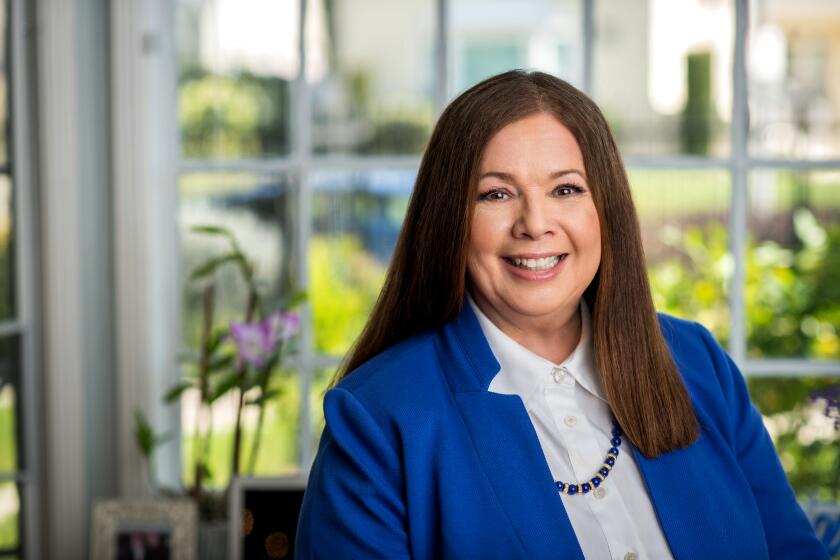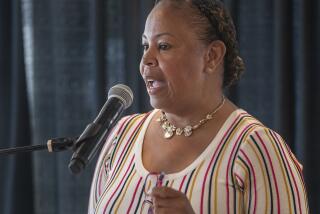Endorsement: Kenneth Mejia for city controller

It’s unusual for the Los Angeles city controller’s race to garner so much attention and inflame so many passions. The controller is the city’s auditor and chief accountant, and the office pays the city’s bills.
The two candidates on the Nov. 8 ballot are Paul Koretz, a longtime city councilman, and Kenneth Mejia, a 31-year-old certified public accountant. In the June primary, The Times editorial board endorsed Mejia and we still think he’s the better choice for the job.
Throughout the campaign, Mejia has shown he will be a creative and incisive controller. He understands what Angelenos want to know about their government, and he knows how to present valuable information in easy-to-understand ways. He repackaged the mayor’s budget data to more clearly show how the money would be spent. He filed California Public Records Act requests for city data and produced maps identifying apartments designated for low-income tenants in market-rate buildings and the areas where officers issue the most parking tickets.
When the City Council began debating whether to block homeless people from setting up tents within 500 feet of schools and day-care centers, there was no tally of school sites or an assessment of the effect. Mejia quickly compiled a list of roughly 1,900 schools and day-care centers, mapped them and estimated the ban would make 20% of the city’s sidewalks off-limits to camping. Such timely, relevant data inform the discussion.
The L.A. Times’ editorial board endorsements for statewide ballot measures, elected offices in Los Angeles city and county, L.A. Unified School District board, L.A. county superior court, statewide offices, the state Legislature and U.S. House and Senate seats.
An auditor and CPA who became a community activist, Mejia brings unique skills to the job. He has the technical expertise to assess the finances and performance of city departments. And he has an organizer’s savvy for energizing people to action. Mejia is a City Hall outsider who does not have the support of L.A.’s traditional power structure, including labor unions, business interests and homeowners groups; he brings political independence and a willingness to challenge the status quo. Once elected, he would also need to quickly build relationships within city government to be effective.
That’s important because the controller has little direct power. The controller can conduct fiscal and performance audits of departments and programs, but the office has no power to compel policy or budget decisions. Instead the controller has to work with the mayor, City Council and department heads to implement change, which requires trust and collaboration. The controller can use the bully pulpit to prod leaders into action, but that can antagonize the people who approve the office’s budget. It’s a difficult balance.
Koretz, termed out after 12 years on the City Council, seems more interested in remaining in elected office than in being the taxpayers’ watchdog or government reformer. His website offers no proposals for what he would do as controller.
During his time on the council, Koretz has largely been a defender of the status quo. He’s never challenged budget-busting labor contracts that add to the city’s structural deficit. He’s fought efforts to make it easier to build more housing and blocked projects to add bike and pedestrian safety improvements. He’s chair of the committee overseeing animal welfare and sits on the budget committee, yet he seemed surprised when The Times reported this summer that the city’s understaffed and underfunded animal shelters were in crisis, with dogs going unwalked for weeks and small animals left without food and water.
Hydee Feldstein Soto would bring deep legal expertise, independence and intellectual curiosity to the job.
Some of Mejia’s past decisions have raised concerns with many people. Two years ago, during the 2020 presidential campaign, he tweeted some bombastic comments, including calling Joe Biden a racist and a rapist. He said he has apologized to his supporters for the tweets and said they don’t represent who he is today. Activists associated with his campaign for controller have disrupted debates and public events; Mejia said they are volunteers (some of whom have been paid stipends) and he doesn’t and can’t control what they do on their own time, but they won’t be part of the controller’s office if he is elected. Mejia says he recognizes as a government official he will have a very different role from that of activist.
Other criticisms of his record are unfounded. He didn’t say he wants to defund the police to “every last penny.” He was live tweeting other people’s public comments during a budget committee meeting. Besides, the controller doesn’t have the authority to touch the Los Angeles Police Department budget even if he or she wanted to. The complaint about his expired or inactive CPA license amounts to little. Under state law an active license is required only for people conducting public accountancy, which Mejia said he was not doing in his private accounting jobs during that time. The job of controller does not require an active CPA license or even training in that field.
If voters look past the mudslinging they will find in Mejia a candidate who is serious about making government more transparent, accessible and functional for the people of Los Angeles — not the special interests that have stymied reform and progress.
More to Read
A cure for the common opinion
Get thought-provoking perspectives with our weekly newsletter.
You may occasionally receive promotional content from the Los Angeles Times.












